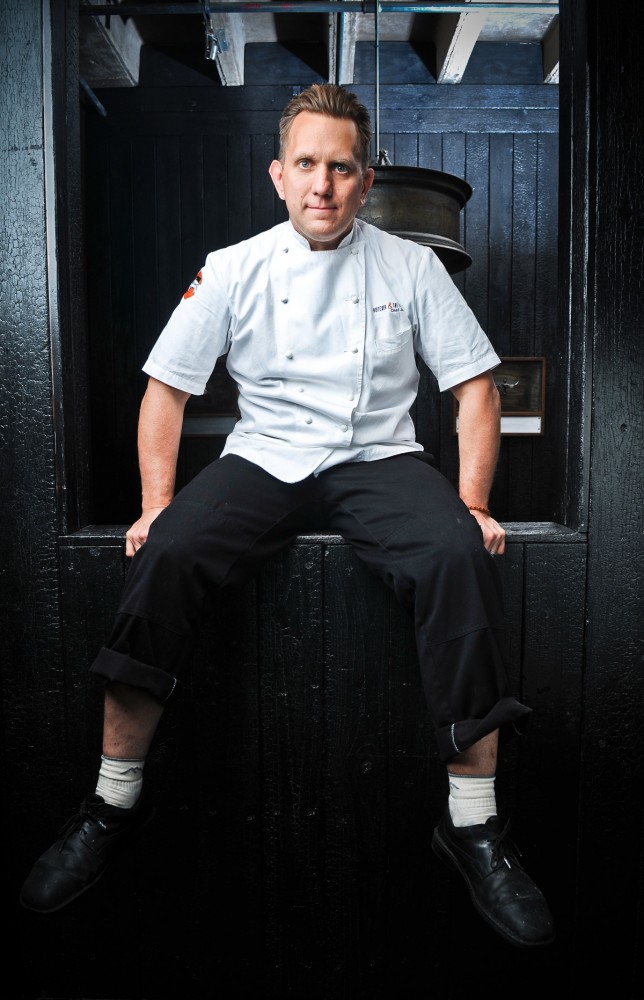If you glance at Butcher & The Boar’s sausage-laden menu, you might just mistake Jack Riebel for a traditionalist. His cooking may seem sentimental, yet his outlook on food is anything but.
His restaurant has won numerous local and national accolades with its old-school menu. Riebel himself was a semifinalist for the 2013 James Beard award — frequently referred to as the Oscars of the food world. Despite all this, Riebel is enthusiastic about the future of the culinary world.
A&E spoke with the decorated chef about the changing food culture and his background in cooking.
How did you get your start cooking?
Washing dishes. Well, my first job in high school was actually cleaning bakeries. Bakery scrubber.
Were you interested in cooking initially? Or did the job lead to the interest?
Well, when I was a kid, it was a requirement in my family that you had cook one meal a week and wash dishes once a week. You never had to clean any dishes on the same day, so the deal was that you cook the messiest or trashiest thing you could ‘cause your siblings had to clean up. It kinda became a competition.
When you were in your early 20s in culinary school and working in restaurants, what would you cook yourself at home?
Well, I’m probably not any different than any other chef. If you work until 11:30 or 12 at night you find yourself going for convenience food. To me, if we had an extravagant late night, we’d cook tacos or frozen pizza. Really anything you could bake on a piece of bread or a tortilla. A couple of beers, y’know.
Is that common among professional chefs? Getting burnt out on cooking and not wanting to cook for yourself?
I wouldn’t use the words “burnt out.” I heard the metaphor once that a painter’s house is never painted. You know what I mean? I think of cooking as a craft like painting. It’s really fun for me now that I’m not just a line cook and I have flexibility. When we have days off, we’ll cook for the neighbors and have fun with it.
Do you have any advice for amateur chefs?
My advice to young cooks would be to make it an avocation, not a vocation. Make it a hobby. The thing that really appealed to me in cooking was that when I grew up as a city kid in St. Paul, there was plenty of stuff I probably shouldn’t have done, but for me to go into the kitchen, it was one of the first situations where the level of creativity was really limitless. There aren’t really boundaries; there aren’t really rules. I mean, there’s a set standard of techniques and methods, but after that is an amazing level of creativity.
Do you think there’s been a shift in how young people look at food?
I think we’re really in a cool time now. It wasn’t long ago in the ’50s when it was all about convenience food. It was TV dinners, it was pot pies; you cooked food faster and easier. But now I see young people that want the leisure time. They enjoy cooking. They want to go to the farmers market. Twenty-five years ago when I started cooking, that didn’t exist. I think the younger generations are finding the time to really enjoy the entire process.
Are there any dishes you think any amateur chef should know how to cook?
Well, I can answer that two ways. You’ve gotta learn how to cook rice. There are kids who come out of culinary school who can’t steam a pot of rice. Eighty percent of the world is sustained on rice, and these kids don’t even know how to cook it.
I think one of the biggest things that separates home cooks from professionals is sauce-making. It may seem a little old hat or old-school French, but I think you’ve really got to have that in your repertoire if you wanna have chops. Julia Child’s beef bourguignon might sound cliché, but if it’s made right it’s one of the best things ever.
Your restaurant serves a lot of meat-and-potatoes type dishes. How do you feel about current health food crazes?
It’s awesome. At the end of the day, I don’t know if organic is better than conventional growing. I’m not sure about that trend. But the idea of super-foods like kale or quinoa or blueberries I think is revolutionary. We’re learning more and more about the food that we eat and where it comes from. I think that particular trend is really important. I think stewardship of the food world is really top on the priority of what I see as awareness. Call it a trend, but I think people care, and that’s really important.








